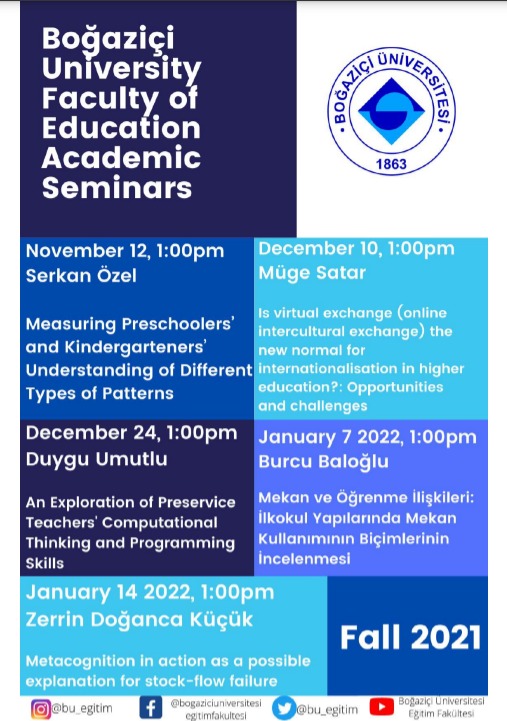| Pt | Sa | Çar | Per | Cu | Ct | Pa |
|---|---|---|---|---|---|---|
| 1 | 2 | 3 | 4 | 5 | 6 | |
| 7 | 8 | 9 | 10 | 11 | 12 | 13 |
| 14 | 15 | 16 | 17 | 18 | 19 | 20 |
| 21 | 22 | 23 | 24 | 25 | 26 | 27 |
| 28 | 29 | 30 |
Measuring Preschoolers' and Kindergarteners' Understanding of Different Types of Patterns

Children's early math knowledge predicts later math and overall academic achievement (Duncan et al., 2007). One important, but often overlooked, skill related to early math development is patterning (Wijns et al., 2019; Zippert et al., 2020). However, there is not an established, commonly used measure of early patterning skills, nor a good understanding of how varying pattern types, rules, and tasks influence children's performance (e.g., Rittle-Johnson et al., 2013). The purpose of the current study was to advance development of a short and easy to administer, teacher- and researcher-friendly, patterning instrument that reliably assesses the repeating and growing patterning knowledge of both preschool and kindergarten students. This study focuses on a new online version of an Early Patterning Assessment (Rittle-Johnson et al., 2020) administered virtually across the full target age range for the assessment (i.e., preschool and kindergarten children; see Figure 1 for sample items). All sessions occurred via a synchronous Zoom session, with a parent or guardian present with the child. Participants were recruited from a departmental research database and local schools.
Children (n = 96) were assessed in Fall 2020. Participants were between the ages of 4 and 6 (M = 5.1 years, SD = .65 years), with 57 participants in preschool, 36 in kindergarten, and 3 not attending school. Children demonstrated some patterning knowledge. Children's repeating and growing patterning knowledge were positively correlated, r(95) = .40, p < .001, and children were significantly better at completing repeating patterns compared to growing patterns, t(85) = 11.41, p < .001. Our online Early Patterning Assessment provided reliable estimates of White, middle-class preschool and kindergarten children's overall and repeating patterning knowledge. However, revisions are needed to improve the reliability of our growing patterning subscale and the assessment needs to be administered to a more representative range of children.
Short bio:
Dr. Ozel works in the Department of Mathematics and Science Education at Bogazici University. Dr. Ozel, who continues his projects with TUSAŞ, TUPRAS and TEGV in Turkey, worked as visiting professor in the Department of Psychology and Human Development at Vanderbilt University, USA between 2019 and 2021. He received his undergraduate and master's degrees from Boğaziçi University, Department of Secondary Science and Mathematics Education. He pursued his doctoral degree in Educational Psychology with the specialization in Educational Technology at Texas A&M University. Dr. Özel's research interests focus on mathematics teaching practices, technology integration, and Science, Technology, Engineering and Mathematics (STEM) education. In addition to his expertise, he is active in many commissions at Boğaziçi University and scientific journals. He is also a founding member of the Mathematical Education Association. He is a founding member of FeTeMM (Turkish acronym for STEM) to adapt STEM movement in Turkish context.
You can join the seminar by clicking here.

